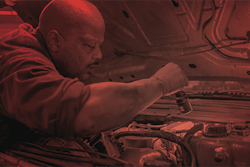There are countless articles about the importance and value of mentorship, and we recently saw many of these voices during Women’s History Month in March. Many of these articles strike home at the essence and reasons why mentorship is especially critical for professional women in the workforce.
However, for professional women in a male-dominated industry such as trucking and transportation, these articles go beyond simple inspiration. They can be the difference of a short-lived career, or that of an enduring one where you can truly leave a lasting impression on not only women, but also the industry as a whole.
I immigrated to the U.S. when I was 10 years old from the Czech Republic, not knowing a word of English. I worked two jobs in high school to help my mother make ends meet and worked three jobs while attending college full-time on an academic scholarship. I spent a lot of time in the restaurant industry working on weekends and holidays, envious of guests on the other side of the table. It’s true, my sheer determination led me to where I am now – being a wife, mother and gaining knowledge and experience from many male-dominated industries. But along the way it has been clear to me the importance of finding opportunities to help other women advance.
According to a recent survey, 56% of American workers have had a professional mentor, while 76% believe that mentorship is important. Previously working in male-dominated industries, including construction and motorcycle equipment, I am passionate about helping other women as they pursue careers in transportation. I have experienced the difference hard work and women can make, not only through mentoring to other women, but also by bridging the gap with men in the industry to help them understand gender differences as well as varying values women can offer their companies.
At the start of my career, I felt the right thing to do was to become “one of the guys," understanding the language and learning their way of communicating with one another. I was passionate about my work and projects, intensely focused on client service, and was certainly growing confidence within the industries I worked. But, along this journey I began to grow more confidence and I realized the importance of stepping outside this mold and understanding the distinct differences between men and women – particularly in the areas of communication. For me, I was fortunate to work in a company environment where these diverse voices were encouraged, even within a male-dominated industry.
Other women are not so lucky. Many do not have the fortune I’ve had with supportive senior management. This is where mentorship becomes so critically important.
I know this because I’ve seen it first-hand through my involvement with transportation associations and organizations where I’ve had the luxury of meeting hundreds of other professional women. Learning from these women has been instrumental in furthering my own professional career, as well as shaping the type of mentor I’ve now become to other professional women – of all career levels – inside my own very organization. I’ve also made it a priority to focus on nominating women colleagues for industry awards and speaking engagements inside my organization so they can shine under their own spotlight, and it was also important that I encourage them to attend the Women’s Forums from various associations for additional growth opportunities.










